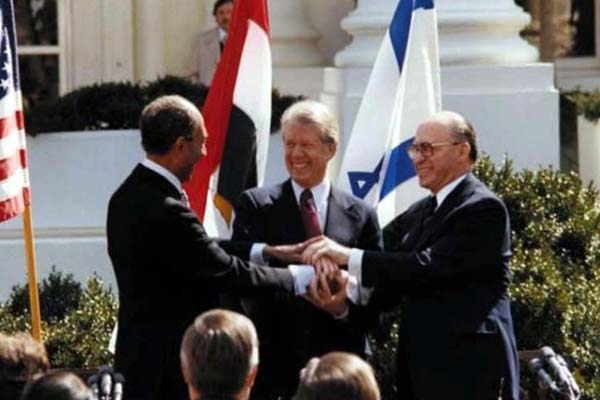David Finkel
Posted January 3, 2025

On the occasion of Jimmy Carter’s passing, I pulled up the archival recording of the signing of the Camp David Accords, September 17, 1978.
What I remembered most about the event happens just after the 25-minute point. Check it out for yourself. After Menachem Begin and Carter embrace, Begin walks over to Anwar Sadat, who looks to me like he’s ready for a handshake. Instead, Begin clasps him into a big hug, which Sadat of course can’t refuse.
From that moment, Sadat’s status as an independent Arab leader was finished. He would be totally dependent on U.S. benevolence. That bear hug was the kiss of death — Sadat knew it, Begin must have known it, only poor Jimmy Carter never knew it.
Sadat survived almost three years before he was assassinated. Begin would ultimately disappear into depression after Ariel Sharon tricked him into the full-scale invasion of Lebanon and siege of Beirut in 1982, which ultimately ended on Ronald Reagan’s orders, of all things. Sic transit gloria mundi, as they say.
On the global scene, Jimmy Carter is being remembered for two big things: the humanitarian and human rights work he did after his one-term presidency, and the supposed “crowning achievement” of the 1979 Egyptian-Israeli peace treaty following Egyptian president Anwar Sadat’s trip to Jerusalem in 1977 and to the Camp David summit in 1978.
Praising Carter’s post-presidential work, I think, is legitimate enough, especially when you compare his personal morality and commitments to many other presidents — a low bar to be sure. But it’s too easy to forget his legacy as a Cold Warrior, which included encouraging the jihadist war in Afghanistan and supporting brutal Central American dictatorships, all of which were escalated to whole new levels by Ronald Reagan.
Carter’s most fatal miscalculation was coddling the Shah of Iran, praising “the love your people hold for you,” attempting until almost the very end to preserve that regime, then inviting the deposed Shah to fly to the United States.
This gave Ayatollah Khomeini the pretext to seize the U.S. embassy in Tehran, with the Students Following the Imam’s Line as the shock troops. Some of them later regretted their role in enabling a big step in consolidating the theocratic hijack of the popular revolution. There’s more to say about what happened in Iran, but the U.S. role is conveniently mostly forgotten now.
Above anything else, the twin disasters of inflation and the hostage crisis were what doomed Carter’s reelection chances. (The Reagan camp connived with the Khomeini regime to prevent the release of the U.S. hostages in Iran before the election.)
Back to Camp David and the subsequent Egypt-Israel peace treaty. It was widely condemned in the Arab world and pro-Palestinian movement as a “separate peace.” I think that missed the real problem. When countries that have been at war don’t want to fight anymore, then go make peace. Why not?
But while the Egypt-Israel treaty was labelled a “separate peace” that broke up the Arab states’ front against Israel — which in practice was largely illusory anyhow — the truth is that it wasn’t really a separate peace. It included a fraudulent “autonomy” scheme for the Occupied Palestinian Territories, in which Palestinian opinion wasn’t consulted at all, and which Begin was 100 percent explicitly clear meant “autonomy for the people, not for the land.”
In other words, Palestinians would have some vague, constricted self-government, but Israel would control the land, permanently. The autonomy scheme was implicitly annexationist in intent. And Sadat, locked in Begin’s kiss-of-death embrace, could do nothing about it even if he’d wanted to.
Recalling the historical trajectory is important here. For several years before 1978, pressure had been building on Israel and its U.S. patron to speak directly with the PLO as the representative of the Palestinian people. (The State Department already had back-channel communications.)
Camp David, the peace treaty and the “autonomy” fraud broke that pressure. By the time Israel officially negotiated with the PLO almost fifteen years later, Israel had invaded Lebanon, the PLO leadership was exiled in Tunis, its ability to defend the Palestinian people was broken — and Hezbollah was ascendant in Lebanon and Islamist strength was growing in Palestine.
In 1994 the PLO accepted what were essentially terms of surrender, and the U.S. stepped in to manage what’s been called a “peace-industrial complex” that predictably produces nothing but creeping-turning-to-galloping annexation under the pretext of seeking a two-state solution that always fades into the distant horizon. Ilan Pappe’s new, essential book Lobbying for Zionism on Both Sides of the Atlantic includes a powerful analysis of this never-ending fiasco.
Jimmy Carter, to his credit, later got at least part of the point, and his 2006 book, Palestine Peace Not Apartheid, was reviled in Zionist establishment outlets for telling some basic truths about where Israel and its U.S. lobby were going.
In Carter’s view, Begin and successive Israeli governments broke the commitments Begin made at Camp David. But there never were such promises: Begin’s commitment was to preserve the ultimate annexationist goal. The U.S. could have imposed some version of a two-state solution then, however distorted, but never even tried, partly due to imperial calculation and partly the power in Congress of the Zionist lobby.
Beyond the scope of this brief article is a discussion of Carter’s domestic policies and how they opened the door to the Reagan 1980s and the neoliberal era. These included the 1980 Chrysler bailout, which imposed massive concessions on autoworkers, accelerated the decay of the labor movement, and led workers to abandon the Democratic Party establishment that had abandoned them.
Carter also signed into law the Hyde Amendment, barring Medicaid payment for abortions, a bitter legacy which persists until today. Other folks can add important details.
Yes, Carter in later life did much that was genuinely admirable. But his legacy as president was imperialist and politically disastrous.
The cynical pursuit of Middle East peace without actual Palestinian voices helped set the stage for today’s genocidal catastrophe — and ultimately, as Prof. Ilan Pappe and other analysts believe, the rot and slow-motion implosion of the Zionist enterprise too. We can only hope that it won’t take down what’s left of Palestine, a big part of the Jewish people, and much else besides, along with it.


Leave a Reply